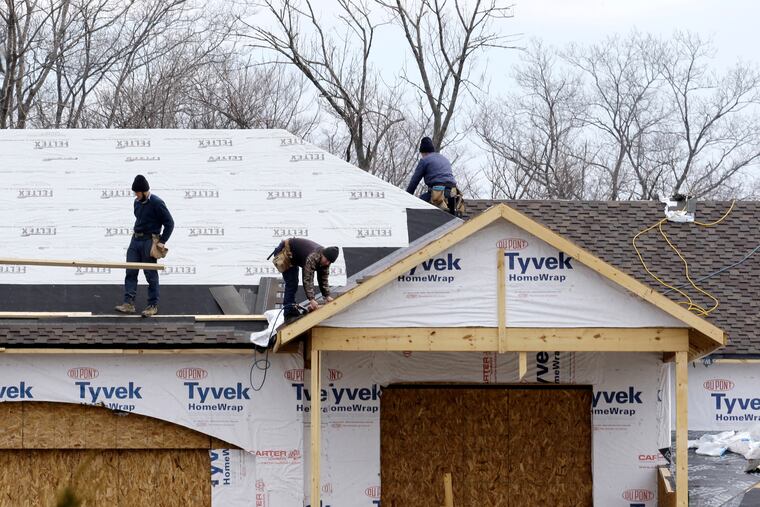Doing roof work in the Philly area? Here’s how to pick a roofer
Use Checkbook’s ratings of local roofing contractors. In its evaluations of area roofing companies, it found big company-to-company differences in customer satisfaction.

The responsibilities of homeownership don’t get more basic than keeping a roof over your head. Fortunately, most roofs last well over 20 years. Unfortunately, when you need a new one, the cost can be as steep as the slope on a 1940s Cape Cod.
And if you hire the wrong contractor, you can spend thousands of dollars too much and still get terrible work. Even when things don’t go horribly wrong, many roofing businesses create too many minor annoyances for their customers, including months of waiting (with pots catching drips), uneven rows of shingles, poor cleanup, and damaged landscaping.
The key to avoiding such goofs is to hire a reliable roofing contractor, get in writing exactly what will be done, and keep a close eye on the job as it progresses. Fortunately, the nonprofit Delaware Valley Consumers’ Checkbook discovered you don’t have to pay more to get great work. Here are tips for finding a reliable roofer.
Use Checkbook’s ratings of local roofing contractors. In its evaluations of area roofing companies, it found big company-to-company differences in customer satisfaction. Until August 7, Checkbook is offering free access to its ratings of area roofers to Inquirer readers through this link: www.checkbook.org/Inquirer/Roofers.
Checkbook’s undercover shoppers also found huge price differences when they asked companies to bid on several different, carefully specified reroofing jobs. For one project, prices ranged from $8,400 to $14,193. For another job, quotes ranged from $5,995 to $10,000. For the third, prices ranged from $7,645 to $16,735.
Checkbook found no price-quality relationship for roofing work, as highly rated companies were just as likely to quote low prices as companies that earned low marks for work quality.
Get several bids for your job. There is no hard-and-fast rule on how many to get, but, in general, the larger the job, the more bids you should get. If there are large differences between the first two or three bids, you should seek more. And get more bids when labor — not materials — constitutes a large part of the cost. All contractors pay roughly the same amount for materials, but hourly labor rates and productivity may vary substantially.
If you can’t be present during the estimate, email your specifications in advance. Use estimators as your consultants, getting feedback from them to determine what needs to be done. Then go back to them with the final description of what you want and invite them to bid on the work.
Before deciding on any contractor, ask for proof that it is licensed and carries liability and workers’ compensation insurance.
Get a copy of the warranty from the manufacturer of whatever roofing materials are used. Also get a warranty on the roofer’s work, ideally for five years or more; have the roofer write into your contract: “In addition to all other warranties, if roof leaks within five years [or, better still, 10 years], except as a result of accidental damage, contractor will bear the cost of labor and materials to eliminate all leaks.”
Get a fixed-price contract. Specify exactly what roof areas are to be covered and other details, such as whether old shingles are to be removed, whether flashings are to be replaced, who is responsible for cleaning up and hauling away debris, and exactly what types and weights of materials are to be used.
Although you should be able to obtain a binding contract at the estimate price, most roofers will insist on provisions for extra charges if they will find damaged fascia, sheathing, or structural lumber. Most contracts state that required carpentry will be performed on a “per-foot” or “time-and-materials” basis. Make sure your contract states how charges will be computed, typically per-square-foot or per-linear-foot.
Avoid roofers that require big upfront payments. A 10 percent deposit to secure a spot on a company’s schedule is reasonable but beware the home improvement scammers who demand a large deposit to buy materials. Reputable contractors have credit accounts with their suppliers that grant them at least 30 days to pay.
Arrange to pay for all or almost all of the job after the work is complete. Most roofers allow customers to withhold all payments until the job is complete. Try to arrange to withhold at least a portion of the price until your roof has been tested by stormy weather.
Report problems immediately. If you can’t arrive at a satisfactory resolution with the company, file a complaint with your local government’s office of consumer protection.
_______________________
Delaware Valley Consumers’ Checkbook and Checkbook.org is a nonprofit group that rates service providers to help consumers get the best service and lowest prices. It is supported by individual members and takes no money from the service providers it evaluates.